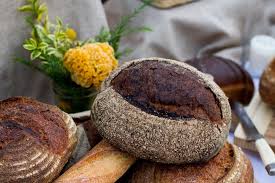Sourdough bread, celebrated for its distinctive taste and texture, has captured the attention of home bakers worldwide. In a significant advancement, scientists are investigating its health benefits through the HealthFerm project, an innovative European initiative led by Professor Christophe Courtin at KU Leuven. The research explores how fermented foods impact human health and the environment.
The project has successfully engaged European communities, collecting over 800 sourdough starter samples from enthusiastic home bakers. This diverse range of starters creates a rich microbial library, crucial for identifying beneficial microbes involved in fermentation. HealthFerm scientists are employing state-of-the-art genomic sequencing techniques to characterize these microorganisms, paving the way for developing innovative plant-based fermented products to enhance gut health.
A significant element of HealthFerm is its comprehensive methodological approach, which includes five extensive human intervention studies. These studies will empirically evaluate the effects of fermented foods on participants’ microbiomes and overall health outcomes, potentially linking specific fermentation processes to measurable health benefits.
Ultimately, the HealthFerm initiative aspires to translate traditional fermentation practices into scientifically grounded dietary recommendations. By creating novel plant-based fermented products, the project aligns dietary habits with sustainability objectives, promoting foods that are advantageous for human health and environmentally friendly. This research highlights fermentation’s potential as a tool for nutritional enhancement and positions it as a strategic approach to confronting contemporary health and environmental challenges.


Comments
It is no surprise that we would be able to identify a wide variety of potentially helpful microbes in sourdough starters, and it is promising that a large number of home bakers are helping the project. Where I see this going is the development of a comprehensive list of beneficial (or unbeneficial) species that can be found in most starters, as well as a methodology for how to select for the helpful ones. Through this research, they will hopefully be able to determine what the ideal starter looks like from the data they have available, and they may be able to identify feasible steps that we can use to optimize our starters. That being said, a big appeal of sourdough bread has always been the uniqueness of any given sourdough compared to commercial products (or other sourdoughs), and people may be content with leaving their starters as they are.
I love that they collected so many starters to find potential beneficial microbes! With this many, they will be able to determine how flour type, hydration levels, and how different ‘feeding’ of starters affect the microbes. This could lead to precision fermentation to tailor the process based on specific health needs. By analyzing this data, there is potential to enhance microbes and utilize them in novel plant-based fermented foods while also enhancing the microbes. Besides the microbial diversity, the overall fermentation process itself can enhance the nutrients within the bread. Since sourdough starters typically take time to ferment properly, the nutrients enhanced typically have many anti-inflammatory properties, which is something that could be improved using various microbes within a starter.
It’s really cool to see traditional practices like sourdough fermentation being studied through a scientific lens. The fact that they’ve collected over 800 starter samples shows how diverse the home baking community is. I’m interested in how this research could lead to the development of new plant-based fermented foods that not only support gut health but also promote sustainability. It’s interesting to think that something as old as fermentation could be a tool for addressing modern health and environmental challenges. This study also makes me wonder about how different the microbes were in our starters from class!